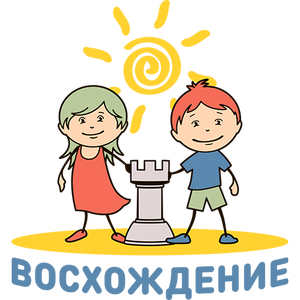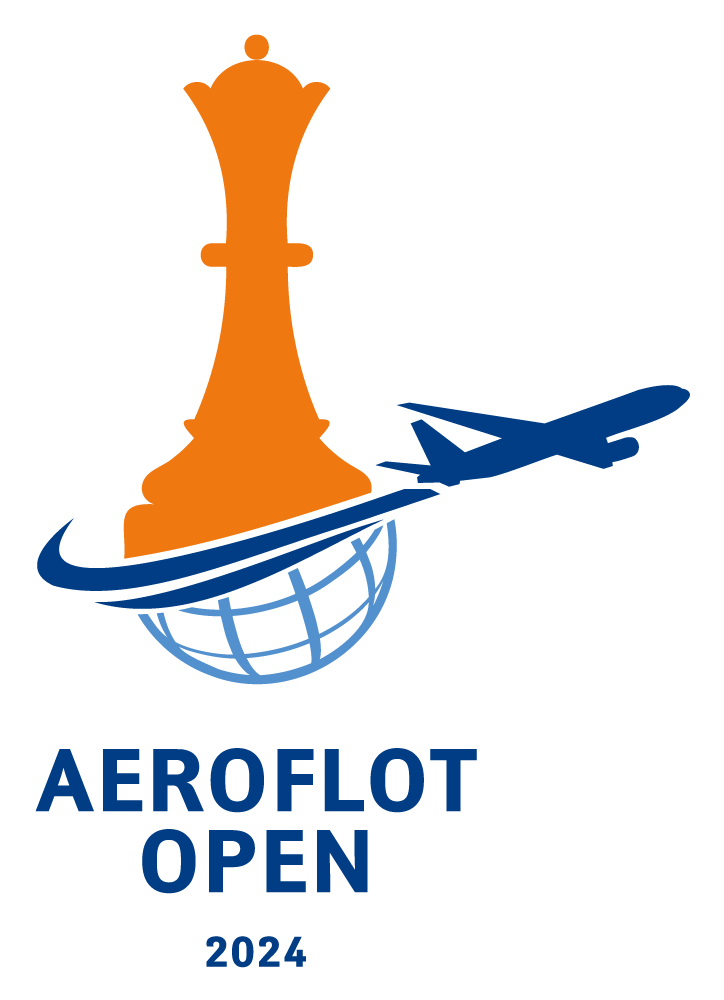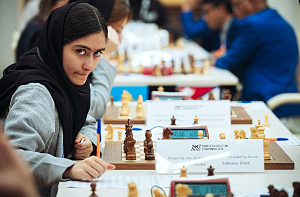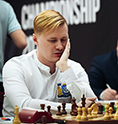In Between Zenit and Loop-the-Loop
The St. Petersburg Summer Festival in the review of Dmitry Kryakvin
To begin with, a row of chess events, to be crowned by the Russian Superfinal of December, is out there in store for the northern capital in the nearest half a year. Even during the tournament, the Korchnoi Memorial and the St. Petersburg Summer director, Vladimir Bykov, was constantly on the go together with the Timchenko Foundation and the Russian Chess Federation representatives (how would he manage everything, I wonder?) to settle on-the-spot issues and those related to the future accommodation of the tournament participants. The preparations are underway at full speed. It is a long time since St. Petersburg has seen the national championship final, an erudite local fan longing for competitions of this caliber! Even more so, the entire country is looking forward to the Superfinals.
St. Petersburg, a city of mighty chess traditions, is experiencing yet another boom in the popularity of the ancient game. A new generation of St. Petersburg players has grown up to form the the national team skeleton and distinguish themselves at the latest World Championship. The Chess Federation of St. Petersburg, with the support of Moscow, has launched a massive assault on the draught players to regain control over a legendary Mikhail Chigorin club and resume the legendary school’s full-fledged training process. This said, the current Russian Cup legs in rapid and classical chess, carried out in the Neva River city, has brought in a real pilgrimage of famous as well as youngster and amateur athletes.
It goes without saying that earning a living bread has became harder for professionals. A grandmaster friend of mine was heard lamenting: “I remember worrying about not getting into the prize money with plus 3 some ten years ago.” Five years ago even +4 would not make it already. Nowadays even +5 is no guarantee at all!” On the other hand, the tournament is very promising with such famous chess players as Daniil Dubov, Alexander Morozevich, Gata Kamsky, Vladislav Artemiev, Evgeny Alekseev, Pavel Ponkratov, Igor Lysyj, Sergey Rublevsky, Vadim Zvjaginsev, Dmitry Kokarev, Konstantin Sakaev, Vladimir Potkin and similar heavyweights. All in all, a total of four dozen highest-titled players were participating. This said, the starting line of the rapid event was toed by as many as 300 participants.
Competitions took place at the Krestovsky Island’s cozy Park Hotel. The place is picturesque, with a maximum of volume of oxygen and a minimum number of cars, which find it hard to reach this area nowadays because the grandiose Zenith Arena has surfaced quite near the Park, the entrances to which are constantly blocked by the forces of law and order. On the final day of the competition, the country’s football championship leader was faced off with one of his closest pursuers, a bulletproof Rostov. It seems to me that at least half a city was gathered there to watch the key matchup. The game ended in a 0:0, however.
Thanks to the football stadium, catering stations mashroomed all around (first of all, it is the Gazprom canteen with affordable prices, but there also exist more expensive meal stations) to solve earlier deficit of food catering services. Also pleasantly surprising was a tournament buffet, which was in charge of a very pleasant team - I was informed that the volume of sandwiches, pies, snacks, coffee and tea sold this time was twice as many as that of the previous year! We urge you to try cater 300 people who deliver a 5-6 round performance a day without any breaks in between.
Last but not least, there is a picturesque "Divo-park" nearby with the Russia’s coolest leisure-time attractions. They are of an opinion that certain entertainment facilities are designed for much more psychologically stable individuals than even those of the Sochi park adjacent to the Sirius. However, a couple of years ago there occurred a sort of a force majeure worthy of the Final Destination film series. Nevertheless, it all ended well after a rescue operation by an emergency team following a little bit of head-down hanging from a height of several dozens of meters. Something to recall for the rest of your life, no doubt! Although there was a certain commotion in the mass media, the fact is the safety system did not fail in this particular case. As of the recent years, an entertainment facility has been functioning flawlessly. Notwithstanding this, I was not one of its visitors this time around. I should have, perhaps. This is what comes of excessive reading of Tigran Petrosian’s books.
The competition was served by a team of arbiters headed by the best "line" arbiter of the modern time Mikhail Krjukov. It was yet another case of Mikhail Vitalievich and his assistants leaving the Appeals Committee with no issues to deal with. By the way, the organizers headed by Vladimir Bykov have taken a very responsible approach to the cheating problems by purchasing a portable metal detector. The start of a classical section gave rise to some suspicions as to one of the games (I do not have all the nuances clarified yet, neither have I looked into the game, so let us dispense with any further discussions for the time being). The security measures were doubled, and there happened no incidents afterwards. Leaders’ games were broadcasted online, while the equipmen operation was maintained by a grandmaster and a wonderful person Irina Sudakova. No incidents bearing any similarity to a famous Russian movie quote “Do you copy? The professor is a patsy!” have arisen afterwards.
I think you are aware by now of a head of the Judicial Qualifications Commission Vladimir Staratorzhsky’s principled attitude towards the cheaters. All Russian tournament games are sent for review by professor Rigan’s program, while Vladimir Yurievich instructs the arbiters to take an immediate care of those under suspicion. Those are not some empty words as only the recent Alekhine Memorial in Voronezh has exposed two such individuals... On the other hand, the arbiters are confident that making it into a prize fund in a similar fashion is no longer an option as a cheater will be revealed in the course of the event. It is going to result in dishonest players’ spoiling somebody’s tournament at the cost of their own careers. Indeed, a cheater’s fame coupled with subsequent society’s contempt is on a par with a potential disqualification. Thus, it makes cheating both dishonest and foolish.
It was interesting to hear on this topic from Igor Bolotinsky, an old-timer of the St. Petersburg’s arbiter panel. Quite recently an interesting situation has been witnessed at the St.Louis Grand Chess Tour with Garry Kasparov among its participants, which I have already mentioned in my website review. Nakamura’s noisy debates with an arbiter made a legendary champion nervous so that he blundered a whole set of material to Caruana. However, when Kasparov started complaining, the arbiter just shrugged his shoulders and went off to mind his own business.
Igor Leonidovich shared about the last “Match of the Century,” which took place in the Kremlin Palace in 2002. Garry Kimovich was delivering an underwhelming performance then and failed to help the Russians outperform the World Team. Back then, however, the arbiters would fear Garry Kimovich like the plague, so that when the Great and Terrible wend down to Judit Polgar, they begged the chief arbiter as one not to assign them to serve the ex-world champion’s table. The onus fell on Bolotinsky as a person both competent and extremely correct. It will not be out of place to mention Garry Kasparov’s post match statement “I am to blame, therefore I head for the Olympiad to make up for it.” The 2002 Bled Olympiad with Kasparov on board one saw the Russian team taking the last Olympic gold in its chess history so far...
The rapid event was preceded by blitz and the Fischer chess (a bright unorthodox tournament with a combative lineup: Romanov, Sengupta, Matinian, Anisimov, while Nikolay Shukh became the winner), coupled with grandmaster Sergey Ivanov’s lecture about Victor Korchnoi and Gata Kamsky’s simul. Gata Rustemovich is a brave athlete! Same day when the rapid started he was faced off with 45 opponents, taking 105 minutes for himself in each game! However fast his play was, he lost on time in several games nonetheless. Simul participants were very pleased with this sort of extreme confrontation against their titled opponent. Kamsky might start thinking about cutting Ghaem Maghami’s world record!
I saw Kamsky draw his game against a clergyman Dmitry Dmitriev. Dmitriev is well known in St.Petersburg. He runs chess tournaments and is a decent chess player himself. Besides, he is busy preparing the most interesting of publications for our website dedicated to the anniversary of Octavio Trompowsky, a Bg5 line inventor. Do not miss it - the author has specially traveled to South America to bring back materials for the article!
As for the tournament, a frantic pace from the start was taken by the Korchnoi Memorial winner, Evgeny Alekseev, who scored eight in a row in the Petersburg Summer! Then he was taken down by the indefatigable Kamsky (any other person would have been completely exhausted by a similar simul!), but Evgeny took clear first nonetheless. Finishing next were heavyweights of the rapid game and just heavyweights - Pavel Ponkratov (who continued his "stellar" achievements on the banks of the Neva River in all spheres of life), followed by Alexander Shimanov, Daniil Dubov, Pavel Tregubov, Gata Kamsky, Igor Lysyj, Sergey Rublevsky and Vladislav Artemiev.
The national women's team members distinguished themselves as well: Alexandra Kosteniuk, Olga Girya, Anastasia Bodnaruk. The most important news, however, was the famous metropolitan chess player Dasha Pustovoitova changing her surname to Voit. I asked Dasha about her motifs for this unconventional decision, and the Moscow native’s answer to the dropped "prefix" was same as Mikhail Tal's about the pawn sacrifice at the chess Olympiad: “It was just standing in my way!” The Petersburg land saw Voit knock out the formidable Alexander Morozevich, not allowing the "terminator" become one of the prize-winners. As simple as that: Lasker, Alekhine, Euwe, Tal, Fisher, Karpov, So, Aronian - a short surname is a recipe for success! Well, seven letters (Carlsen, Karjakin) is the max! I think Igor Lysyj and Danya Dubov also share this point of view.
Thus, the 2017 St. Petersburg Summer festival has come to an end! Nevertheless, a friendly team of organizers and the Krestovsky Island are already looking forward to seeing you at the Chigorin Memorial, which is about to take place before long.




























